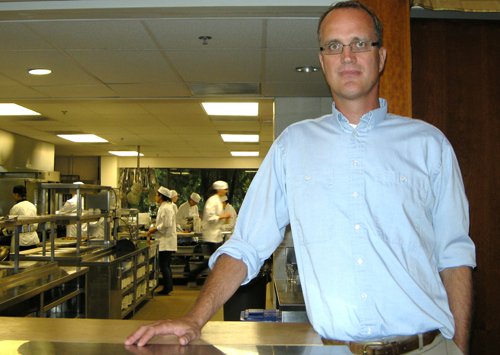
On his drive home to Elora, Prof. Mike von Massow often stops at one of the many fruit and vegetable stands he sees at the end of farmers’ driveways. One that he particularly likes offers a wider selection of produce; over the summer he could buy both melons grown on the farm and peaches brought in from a farm in Niagara.
“That farmer is offering a variety of Ontario produce, and she’s honest about it,” says von Massow. “She doesn’t pretend that the peaches were grown here. And they may not actually taste any different from the peaches I could buy at Zehrs. But she is meeting my need for convenience, and I perceive that the producer will get a bigger share of my money. I’m willing to stop there if I get enough of my needs satisfied.”
At this time of year, shoppers are lured to stop at roadside stands by the sight of fresh squash or baskets of red apples, but most don’t analyze it the way von Massow does. That’s because, for him, a little shopping on the drive home feeds right into his research.
Recently appointed to the School of Hospitality and Tourism Management (HTM), von Massow has strong connections to U of G. He did his undergraduate and master’s degrees here in agricultural economics, then worked in industry for 15 years in several different areas. When he was marketing manager at a pharmaceutical company, he decided to complete his PhD at McMaster University in supply chain operations. “The focus of my dissertation was pricing and the implications of pricing strategies for supply chain managers,” he says.
This is a good fit for HTM, he adds, because pricing is a critical factor in all aspects of hospitality and tourism. “Hotels, for example, have inventory that rapidly expires. If you don’t sell a room tonight, you can’t save it up and have extra tomorrow. So hotel managers use a variety of different strategies to manage their inventories,” he explains. One is to make those unsold rooms available at a discount through a website such as Priceline or Hotwire. This helps fill up the rooms, even though they are sold at a lower-than-usual price.
However, von Massow has found some possible negative effects resulting from this strategy: “People tend not to remember the name of the hotel they booked through hotwire, for example, even if they had a really good experience. So they may not come back to your hotel next time; they may just book through Hotwire again and take whatever hotel comes up.”
The other risk is that people get used to paying the discount prices and subsequently see the “regular price” as too high. “Are we changing people’s expectations when we offer these discounts?” he asks. “You can see some of the longer-term results in the aftermath of the recession. During the recent recession, hotels had fewer bookings and shorter stays. But even as the recession lifts, people are still expecting those discounts and anticipating promotions. That’s what leads to the hangover after the tough times. It might be better to take your lumps now, in terms of unsold rooms, and not have to wait so long to recover when the economy improves.”
The supply chain is also becoming an integral part of the marketing of food, says von Massow. “Food isn’t a commodity any more. You can have two apples, but if one of them is from Ontario and one is from Washington State, or one is organic and the other is not, people will see them differently. We need ways to get food to the market that will protect that identity.”
He’s also interested in people’s perceptions of “local food” and whether they are willing to pay more for food that was grown locally. “I think that in a restaurant setting, the local food is part of the whole restaurant experience and adds to the feeling of the meal being something special,” he speculates. “So people would be willing to pay more in that situation. We don’t know if they’ll be willing to pay more in grocery stores for local foods.” (Not to mention that people disagree considerably about what “locally grown” means.)
One of the joys of working in academia, von Massow says, is “getting to think about interesting questions and knowing that the questions will evolve as you go along.”
When he’s not thinking up new interesting questions, von Massow likes to play hockey two or three times a week. One of the on-campus groups he plays with is a team he helped found 20 years ago as a U of G student; he’s just re-joined. “The hockey is great, but the best part is the camaraderie, the time before and after the game when you are hanging out with friends.”
He’s planning to pass his love of hockey on to the next generation as president of the Minor Hockey Association in Central Wellington. His two boys are also active in sports, although only one plays hockey. The other – already 6’5” at age 15 – plays basketball. His dad is fine with that: “I don’t think the sport matters as much as finding something you can do and enjoy for the rest of your life.”